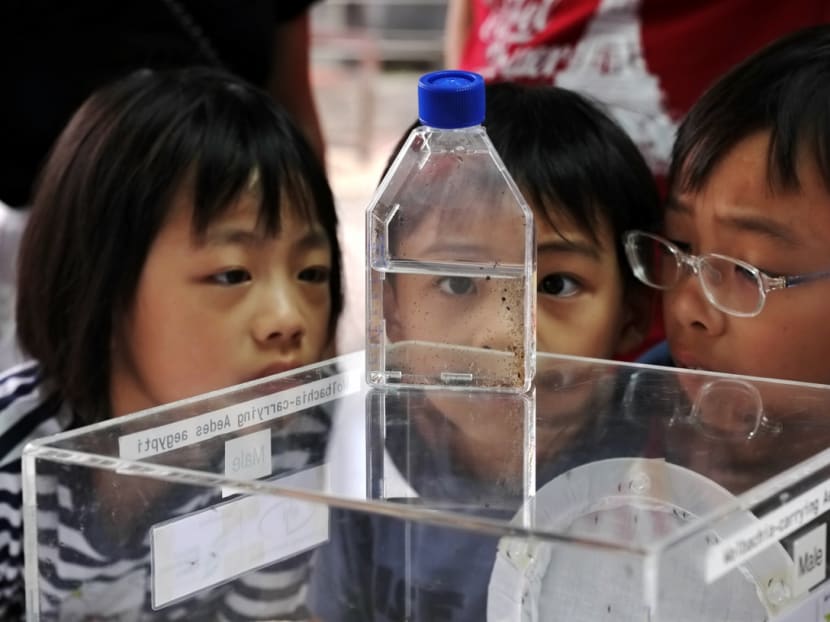As dengue infections double, NEA brings forward campaign to fight scourge
SINGAPORE — There have been more than 4,000 dengue cases since the start of the year, double the same period last year, with the authorities concerned that the jump was driven by a type of dengue virus that the population has low immunity to.

Children looking at larvae and pupae of the Aedes mosquito during the launch of the annual National Dengue Prevention Campaign on March 22, 2020.
SINGAPORE — There have been more than 4,000 dengue cases since the start of the year, double the same period last year, with the authorities concerned that the jump was driven by a type of dengue virus that the population has low immunity to.
The National Environment Agency (NEA) revealed the figures as it brought forward the National Dengue Prevention Campaign, launching it on Sunday (March 22).
Compared to 2017, last year saw a 90 per cent increase in the rate of detection of habitats within homes where Aedes mosquitoes — the carrier of the dengue virus — can breed.
Of particular concern is a spike in DENV-3 cases — a serotype of dengue virus. It has infected 48 per cent of total cases this year, compared to 26 per cent who have been infected by DENV-2.
The DENV-2 serotype has been the predominant type of dengue virus that people here are infected with and have thus built a stronger immunity to. NEA is monitoring if DENV-3 may replace DENV-2 as the predominant serotype.
“The rise in proportion of DENV-3 cases is of concern, as we have not had dengue outbreaks driven by DENV-3 in Singapore for almost three decades,” said NEA.
This means that the population has a lower immunity to DENV-3 and a large proportion of the population may be more susceptible to it, the agency added.
Speaking at an event to launch the campaign, Minister for the Environment and Water Resources Masagos Zulkifli said that while the nation battles the Covid-19 pandemic, it is “not the only public health threat”.
In addition to the potential threat of a new dengue serotype, the Aedes mosquito also thrives on warmer temperatures and more intense rainfall brought about by climate change, which “facilitate the faster multiplication of the (Aedes mosquito) and dengue virus”, Mr Masagos said.
The combination of an emergence of a less common serotype and more mosquitoes carrying the virus has resulted in a higher number of cases, which in turn increases the chances of dengue transmission, he added.
The NEA said that in addition to bringing the campaign forward, it will also be extending it by two months to May, to “sustain awareness at a higher level”.
The campaign is usually held in April or May, ahead of the traditional mid-year peak dengue season.
During the campaign, the authorities will conduct house visits to advise residents on common mosquito breeding habitats and share dengue prevention tips, among other things.
Mr David Lee, a 58-year-old dengue prevention volunteer, said that the increase in dengue breeding habitats within homes could be because some residents do not empty stagnant water from their flower pots often enough.
“Over these years, we’ve been telling residents to take precautions and while they are quite receptive to it, good habits take a long while to establish,” said Mr Lee, who has been conducting house visits for 11 years.
In January the authorities also deployed 14,000 mosquito traps called Gravitraps in new private and Housing and Development Board estates islandwide, taking the nationwide total to 64,000. These traps help remove female Aedes mosquitoes.
The public can get information on areas with relatively higher Aedes mosquito populations on the myENV mobile app.











